|
Back to Hall of Fame
Inductees |
|
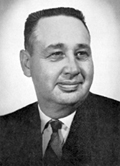 |
Herb Armstrong
(Valley Farm)
(1913-1975, Inducted 2003)
From 1936 until his death in 1975,
Armstrong operated Valley Farm in his home town of Harrington. That nursery led
all Washington breeders by money won seven times (1952, 1954-59), by number of
winners for 15 years (1944, 1946-59) and by number of races won for 14 years
(1945, 1947-59). For 25 consecutive years (1944-68), Armstrong was ranked among
the top 30 breeders in the state. During one 18-year stretch, he bred 87
horses, of which 67 were winners, an incredible 77 percent ratio.
Armstrong’s best homebreds included Washington horses of the year Rover
Bill (1952), Big Success (1955), Johnie Mike (1956) and Sir William (1957). The
latter captured the Santa Anita Derby that year over the immortal Round Table
and was the leading Washington-bred earner of his day. Other notable
achievements for this legendary horseman include being the first Washington
breeder whose state-bred runners earned over $1 million, as well as being named
Washington’s 1960 turfman of the year.
Click
here for expanded profile. |
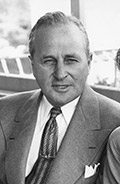 |
Frank W. Brewster
(1897-1996, Inducted 2008)
Frank Brewster’s name first appeared
as a Washington breeder in 1948, when two horses he bred won three races and
earned $2,450, but just two years later he would lead all state breeders with
$44,692. He would repeat his status as top Washington breeder in 1951 and 1953.
From 1948 through 1956 he had 36 runners, of which 20 were winners that earned
194 trips to the winner’s circle. From 1949 through 1956 he would never
rank less than third among all breeders in the state. The Washington
Horse editor and famed statistician Clio Hogan would note “Frank W.
Brewster has had more success in his first five years as a breeder than any
other breeder in the State of Washington – past or present.”
A Washington native, Brewster was a noted name on
the local racing scene well before he decided to join the ranks of its
breeders. He won his first Longacres Mile in 1939 with the three-year-old filly
Brief Moment and he played a major part in both the 1950 and 1951 runnings of
the Mile.
Two and Twenty – who had Eddie
Arcaro aboard – won the 15th running of the premiere Washington event in
1950 by defeating the three-year-old filly Whang Bang. Both runners were owned
and trained by Brewster. Two and Twenty had won the previous year’s
Longacres Derby and Whang Bang, who was bred by Brewster, won the 1950 Derby
and Washington Championship and was voted Washington’s horse of the year
at the end of that season. The daughter of Better Bet, who had also taken the
Spokane Futurity at two, earned a lifetime total of $43,935 and was
Washington’s all-time leading distaff runner for a number of years.
In 1946 Brewster purchased Little Rollo as a
three-year-old and would win both the Governor’s Handicap and Longacres
Derby with him. Little Rollo finished third in the 1947 Mile and was claimed
for $15,000 the following February. The son of Count Gallahad would win the
’51 Mile by two lengths for his new Canadian owners, over Brewster’s
Galavon. Two and Twenty ran eighth.
Brewster was
the leading money winning trainer at Longacres in both 1950 ($29,025) and 1951
($24,950).
Brewster and his partner George C.
Newell, racing under the Breel Stable banner, also won the 1951 Sunset Handicap
at Hollywood Park with Alderman.
A prominent,
powerful and often controversial western Teamster leader, Brewster owned
Clearbrook Farms in Woodinville and Lucky D Ranch near Kent. Among the
stallions he stood were Speculation – who had been the fourth highest
selling yearling in the history of Keeneland – and Two and Twenty.
Brewster died in 1996 at age 99.
Click here for expanded profile. |
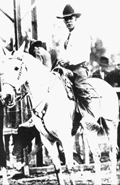 |
George Drumheller
(1874-1945, Inducted 2004)
Deemed “the father of Thoroughbred
horse racing in Washington,” George Drumheller was one of the original
sponsors of Washington State House Bill 59 that allowed racing to return to
this state and paved the way for Longacres to open in 1933. A wheat farmer with
over 1,000 acres in Walla Walla, Drumheller began to dabble with race horses
during “what in the 1920’s was most certainly an obscure business in
this state. Spending thousands of dollars for Kentucky bloodstock and racing
stock,” he was con-sidered the leading Washington horseman of his day.
Drumheller was this state’s leading breeder, by earnings, for six
consecutive years (1935-1940). From 1935 through 1951, he bred the winners of
238 races, tops in the state during that period. His Drumheller Ranch stood
early leading Washington sires Gladiator (sire of 1941 Longacres Mile winner
Campus Fusser), Black Forest (sire of Arlington Park’s Stars and Stripes
Stakes winner Georgie Drum) and Fort Churchill (sire of 1945 Longacres Mile
winner Prince Ernest). Son, Allen Drumheller, a 2003 inductee to the Washington
Racing Hall of Fame in the trainer category, would be the leading breeder in
this state eight times. Additionally, Allen was one of the nation’s most
respected trainers of his day and one of the state’s original racing
commissioners.
Click here for expanded
profile. |
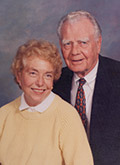 |
William C. and Barbara Nelson Jr.
(Gunshy Manor)
(1885-1964, Inducted 2012)
William and Barbara Nelson Jr. developed and owned Gunshy Manor, a 165-acre farm in Redmond, of which 40-50 acres were devoted to the horses. The Nelsons, mainstays in the industry from the late 1960s until their deaths in the mid-2000s, bred Washington champions Prince Joda, Favored One, Norm’s Nephew and Margo’s Gift. Today, the Nelsons’ legacy lives on as Favored One’s granddaughter, Lexie Lou, won the 2014 Woodbine Oaks (G1-Can) and then defeated 14 male runners in the Queen’s Plate (G1-Can).
Bill was born in Wenatchee and raised in nearby Cashmere. Barbara (Shackelford), though born in Berkley, California, was raised in Seattle. Both were graduates of the University of Washington, where Bill had received a football scholarship and was star athlete and Barbara graduated magna cum laude. Bill later would serve as an Army officer in World War II and graduate with an MBA from Harvard Business School, where he was on the 1943 team that won the national rugby championship. Barbara became only the second woman in UW history to be elected class president and was also the editor of the UW paper, The Daily.
They were married in 1945 and raised five children: sons, Buff, Brian and Michael; and daughters, Janet and Mary.
Bill later became the CEO and president of the insurance and bonding company, Dawson and Company.
The Nelson family had moved to Redmond in 1957, after acquiring 124 acres of the original 160-acre property which was first homesteaded in 1890.
Barbara, who had been exposed to horses as a young child, soon added riding horses to the family farm. The Nelsons, or I should say Barbara, bought a Thoroughbred mare named Triple Punch, a 1957 daughter of Triplean. Her first foal, the 1962 gelding Roman Mutiny, became the Nelsons’ first winner and first stakes horse, as the son of Kings Mutiny finished third in Playfair’s Juvenile Mile Handicap and at three added a second in the Hilltop Handicap at the Spokane track.
Since that successful beginning, the Nelsons bred the winners of close to 600 races and the earners of nearly $4-million. From 1964 through 2009 (the last year they were listed among Washington’s top 50 breeders), their names appeared among the top ten on nine other occasions; and they were listed 21 more times among the top 50 state producers of Washington-bred earners. The Nelson topped the state breeders list in 2007.
From that one mare, the Gunshy broodmare band grew to 13 mares in the mid-1980s and also served as station to homebred stallions Exclusive Listing, Put Em Up and Drumboggie. The well-bred Exclusive Listing (a son of Exclusive Native from the immediate family of Affirmed) was unraced due to injury. Put Em Up, by Staff Writer, won stakes at both Longacres and Bay Meadows. Drumboggie, a winning son of Drum Fire, was a half-brother to Grade 1-placed Villador.
The Nelsons joined the WTBOA in 1958. Barbara served on the board of trustees as a regular member from 1972-1989 and as board member emeritus from 1990-2006. The WTBOA’s second vice president in 1980, she also served on the sales, magazine, finance and special events committees.
The Nelsons bred a trio of Gottstein Futurity winners. In addition to Prince Joda (1971) and Favored One (1994) was Favored One’s older half-brother Krupa (1985).
Two-time champion Margo’s Gift, who raced for Elttaes Stable, would only finish third in the 2007 Gottstein, but later that fall would bring Washington racing fans to their feet when he decisively won the $250,000 Favorite Trick Breeders’ Cup Stakes – under 2014 Racing Hall of Fame inductee Ricky Frazier – held the day preceding the 24th Breeders’ Cup World Championships at Monmouth Park in New Jersey.
Among the many other good runners bred by the Nelsons were additional Washington-bred stakes winners A’La Natural, Bookie Buster, Catch Me, Ego Image, Ekahi, High On Jazz, Luv a Roni, Northern Alert, On Leave, Seaborn, Tight End and Wailea Warrior; non-Washington-bred stakes winner Cleard for Action; and 1985 Washington most improved plater Exclusive Aim.
The Redmond couple also had connections to another Canadian champion as they co-bred – with Packy and Julia McMurry’s Enumclaw-based Royal Match Stud Inc. – the dam of 2007 champion two-year-old filly Dancing Allstar.
Other 2014 Washington Racing Hall of Fame finalists were, by category: male horse: Fast Parade, Handy N Bold and Maxwell G.; filly/mare: Flag de Lune, Snow Plow and Whang Bang; jockey: Doug Dodson, Pepper Porter and Richard Wright; trainer: Cecil Jolly, Bob McMeans and Marion L. Smith; and breeder: Robert L. Edwards, C. F. Flower and Maurice McGrath. |
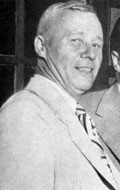 |
George C. Newell
(1885-1964, Inducted 2012)
Born in the Georgetown area of Seattle in 1885, Newell was the president of the large Seattle insurance firm George C. Newell Co., which he had opened in 1921.
Newell got into racing though his brother Hallan, and his first racehorse was the mare Lou’s Puzzle. George began breeding Thoroughbreds in 1938. His first winner came in 1942 and the master of the Kingston-based Newellhurst Farm bred and raced top runners up and down the West Coast, many in partnership with fellow Hall of Fame breeder Frank Brewster (Breel Stables). Among the partnership’s good horses were 1951 $50,000 Sunset Handicap winner Alderman, 1951 Longacres Derby winner Bomb Special,1952 Speed and Renton handicaps winner First Repeater, Silverado and Micoka.
Newell bred and raced 1953 Washington three-year-old colt champion New Miracle (the same year in which he was ranked third among all state breeders) and also bred 1958 Washington Futurity winner Jerry’s Gal, who is probably the only Washington-bred two-year-old to ever break her maiden on New Year’s Day. Other stakes winners bred and/or raced by Newell include Moments Notice, New Oak, New Check, Miss Vanguard and Catch Patch. In 1958 and 1959 Newell reached his highest ranking on the state breeder list, finishing second to fellow Hall of Famer Herb Armstrong each year.
In 1958 Newell bought his wife Geraldine a California-bred gelding named Collaborator who would win the Longacres Mile, Longacres Derby, Spokane Handicap, Playfair Mile and Spokane Derby (the last two in track record time) as a three-year-old while racing in her name. Only two other horses have won the Mile during their sophomore seasons: Exotude (1936) and Brief Moment (1939). Newellhurst Farm had run third in the 1955 Mile with Auther, and Breel Stable colorbearers had finished second in both 1951 (Galavon) and 1952 (Roman Secret) Miles.
Newell’s top Washington-bred earner was New Miracle, who won 37 races and earned $51,973 while racing nine seasons. The best runner to race in Newellhurst silks was How Now. After purchasing the son of Beau Max from King Ranch for $25,000 in the summer of 1957, How Now won 11 California stakes, including setting a new track record in the Del Mar Handicap, and placed in an additional 15 stakes en route to lifetime stats of 26 wins and $339,587 in earnings.
One of the 16 founding members of the then WHBA, Newell was its first president, as well as “for many years its biggest backer and guiding hand.” He was instrumental in securing the five percent breeders’ awards, which was later raised to ten percent by Joe Gottstein.
Newell, who passed away on August 24, 1964, at age 70, stood leading Washington sires Black Forest (1944, 1946-48) and Better Bet (1950), along with Jean Miracle, Galavon, *Basilio, New Resolve and Alderman. He also was one of the founders (1959) and president of the Yakima Valley Turf Association and the first writer and managing editor of The Washington Horse.
Newell was honored with the 1959 WHBA Turfman of the Year Award, an honor he shared with fellow pioneer horseman A. E. Penney.
According to former WTBOA general manager Ralph Vacca, “George Newell, next to Joe Gottstein, did more than any other person to give birth to our racehorse industry. He negotiated and shaped policy, thus allowing for the industry to take hold, grow and flourish.”
In a 1964 interview in The Washington Horse, Newell was hailed as “a dedicated, hard-working individual with a special love for horses . . . (and the) priceless ingredient of foresight.”
|
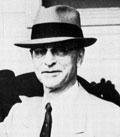 |
C. J. Sebastian
(1885-1967, Inducted 2006)
Washington’s 1963 turfman of the year,
Christian J. “Seb” Sebastian first entered racing on a large scale in
1944 when he went to the Keeneland Sales and purchased 14 yearlings. He had
originally just bought 13, but was encouraged not to go home with an
“unlucky 13.” The 14th yearling, which he purchased for $1,200, Galla
Damion, put the Kirkland breeder on the racing map. As a three-year-old, the
son of Sir Damion set a new world’s record for seven furlongs and was
considered one of the early favorites for the Kentucky Derby. He was a
three-time stakes winner of $69,790 and became a significant sire in
Washington. Another of that fateful group was Blue Tiger, who won the 1949
Longacres Mile in Sebastian’s colors (Galla Damion finished fourth in the
$18,200 race). A winner of 20 other races, the gelded son of Tiger earned
$64,550. But probably the most significant among that group of yearlings was
Dusky Chance, Washington’s 1963 broodmare of the year and dam of four
stakes winners, two of which went on to become state champions. Her leading
earner, Dusky Damion, a son of Galla Damion, won or placed in 18 stakes races
in Washington and California and earned $171,650. Dusky Chance’s second
champion, though bred by Sebastian, was raced through most of his career by Ned
Skinner and Melville “Jack” McKinstry. Due to health reasons,
Sebastian had sold all his Thoroughbred holdings and Kirkland farm in the
autumn of 1961. Dr. John H. is the only horse that ever came close to sweeping
Longacres top three events, as he won the Washington Futurity, the Longacres
Derby and finished second in the Longacres Mile (at three).
Sebastian was Washington’s leading breeder by
earnings for three years (1961-1963) and was also leading breeder by races won
in 1963. He bred the winners of $631,234, and that was enough to rank him
second among all breeders in 1966. Sebastian’s first Washington-bred
runner reached the races in 1950 and he had his first statebred winner the
following year.
A longtime WTBA member, Sebastian
served as a board of trustee for seven years and as president of the
organization in 1957.
Click here for expanded
profile. |
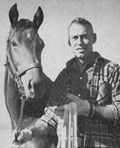 |
Les Turner
(1923- , Inducted 2010)
Born in Canada, Les Turner was only one when he and his mother and eight-year-old sister moved across the border to Cedonia, near Kettle Falls in north Stevens County. He always had dreams of having a horse and cattle farm, so after his graduation from high school he acquired two Thoroughbred stallions. Truly Rural, a 1936 son of Milkman, came from the US Remount Service. The stallion’s name was part of the inspiration for the name of Turner’s highly successful Rural Land Farm.
Based in the centrally-located Quincy, Rural Land Farm stood many of the preeminent stallions of the time, including seven-time (1967-1974) leading sire and three-time leading juvenile sire Strong Ruler, as well as leading juvenile sires Six Fifteen, Alate and Kings Favor.
One of the most progressive horsemen of his era, Turner stood the first syndicated stallion in the state, By Zeus, who would later best be known as the damsire of the great Turbulator. Turner was also the first advertiser to use color in The Washington Horse (January 1961) and the first to have a full color cover, when Strong Ruler appeared on the January 1963 issue. Other early ads touted that horses at the Columbia Basin farm were “Raised where feed, climate and space are incomparable.”
Turner’s name was first seen listed in the breeder ranks in 1954, when his initial runner earned just $25. After a three-year hiatus, he had his first winner in 1959. By the time 1961 rolled around, his revolutionary color ad proudly proclaimed 27 winners of 88 races from 33 starters.
Rural Land Farm was featured on the cover of the January 1958 The Washington Horse, where it was noted to be “one of the most modern Thoroughbred breeding farms in the Northwest.”
Turner, who became strictly a market breeder, sent his first five yearlings to the WHBA sales in 1961 and came up with stakes winners Me-Jo and Stardust Melody and stakes-placed Sully’s Gold.
He ranked first in winners in the state in both 1976 and 1977 and was ranked in the top ten by money earned on 16 occasions from 1963-79. Among the many stakes winners bred or co-bred by Turner were state champions Better Dancer, Stardust Melody, Gold Afloat, Alation, Strong Dolphin and Touchdown Miss. He also bred and/or co-bred 1972 Washington claimer of the year Dancing Ruler and 1988 Washington most improved claimer Sucess Formula.
Alation and Royal Ruler were among the seven Washington (now Gottstein) Futurity winners sired by Rural Land stallions, starting with Smogy Dew in 1963. In fact, between 1963 and 1973 Rural Land Farm-sired runners earned over 23 Washington championship titles, including four horse of the year awards.
Today, Turner, now in his 80s, lives on a small portion of his former farm where he is known for raising beautiful dahlias. |
Go to Top |







